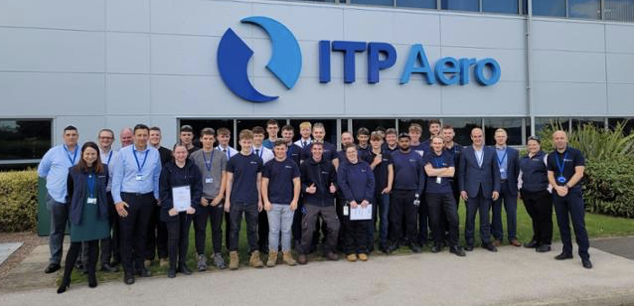ITP Aero, the Hucknall-based aviation propulsion manufacturer welcomes the decision of the European Union’s Clean Aviation programme to proceed with over €700m of funding for 20 aviation research and innovation programmes from across the industry.
Following the evaluation of first Call for Proposals, a proportion of this funding, subject to successful completion of grant preparation, will enable ITP Aero and partners, to carry out ground-breaking research that will accelerate sustainable propulsion and decarbonisation research.
The Clean Aviation Joint Undertaking is the European Union’s leading research and innovation programme for transforming aviation towards a sustainable and climate neutral future. The four projects in which ITP Aero participates (HEAVEN, HE-ART, CAVENDISH and TheMa4HERA) will focus on three main technology pillars:
Ultra-efficient aeronautical architectures to address short and medium haul needs with innovative gas turbine configurations to help reduce emissions.
Hybrid and electric architectures by promoting research into new hybrid electric engine architectures and their integration.
Disruptive technologies for hydrogen-powered aircraft. To enable aircraft and engines to exploit the potential of hydrogen as an alternative fuel.
The four Clean Aviation programme projects in which ITP Aero participates are in addition to the ENGRT (EU Next Generation Rotorcraft Technologies) project of the European Defence Funds (EDF) awarded on July 2022. The ENGRT project will focus on the next generation EU military rotorcrafts. The project will include the analysis of future needs, key future rotorcraft features and capabilities, alternative rotorcraft platforms, flight demonstrators and simulators. The project will also produce a military rotorcraft technology roadmap, strategies for modularity and manufacturing, life-cycle analysis and maintenance concepts.
Erlantz Cristobal, Executive Director of Technology and Engineering at ITP Aero, said: “ITP Aero is focused in spearheading the transition towards sustainable propulsion systems and this milestone will build on our existing know-how to help accelerate technological breakthroughs in line with our commitment to be a carbon neutral company in 2050″.



